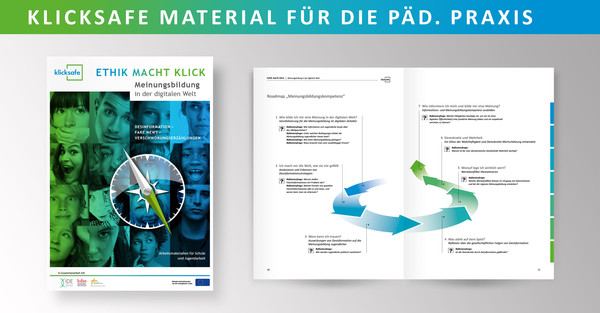Opinion-forming competence
Young people should develop a critical awareness of information and be able to evaluate journalistic texts. However, in order to develop an opinion and an attitude of their own from this, further competencies are necessary. For this, young people need a basicknowledge consisting of factual competence, social competence and ethical competence. These three pillars of opinion-forming competence are briefly presented below. More in-depth information on the topics addressed below can be found in the klicksafe material "Ethik macht klick - Meinungsbildung in der digitalen Welt" in chapter 7 "How do I inform myself and form an opinion?
Functional competence: Understanding media and digital publics
Since knowledge is largely conveyed through the media and modern societies are inextricably linked with media communication, young people should be educated not only in factual knowledge but also in knowledge about the media and digital communication structures.
In order to develop a critical awareness in this regard, young people need to know how the German media system is structured and what frameworkconditions lie behind digital public spheres.
Since the mid-2000s, the flow of informationin society no longer takes place solely via editoriallycontrolled media, but for many above all via social networks such as Facebook, YouTube, Twitter and Co. It is therefore necessary for young people to learn about and understand the technological and economic background to social media platforms and search engines such as Google.
News and posts on these platforms are controlled by algorithmic processes. Relevance is measured less by journalistic guiding values (e.g., truth, diversity) than by the immediate reaction of the audience (e.g., click numbers) and the machine-documented surfing habits of users. This leads to an increasingly personalized and machine-compiled information offering. This media- and communication-specific background knowledge also helps students to better assess the trustworthiness of sources.
Social competence: being able to lead discussions and participate in discourse
Active participation in public discourse has never been easier. Anyone can communicate directly on the web or in social networks at any time.This new role as a sender and no longer just as a recipient of information brings with it a new responsibility, which young people should be made aware of.
In order to be able to take an active and informed part in social discourse, they should develop a basic understanding of their own role in digital public spheres, which requires them to deal with information in a reflective manner due to their own reach and multiplication effects. This includes both an awareness of the existence and impact of disinformation and their own critical approach to manipulative content and misinformation. Students should be encouraged and supported in standing up for their own opinions, even against their own peer group or parents or teachers.
In order for a discussion to be successful and fruitful, certain rules - including rules of social interaction - should be observed:
- Justify your point of view!
To convince others of your point of view, you need arguments, i.e. reasons for your opinion. - Inform yourself!
Good arguments are based on knowledge. They are only convincing if they are based on correct assumptions. - Explain your arguments!
Try to explain your point of view to the others in detail and to support it with examples. - Consider the opposing position!
Try to understand and include the other side as well. - Listen to each other!
If you want to convince others, you must also listen and be prepared to be convinced. - Be fair to each other!
Befriendly with your counterpart and stay calm!
Ethical competence: Developing an attitude
Attitudes can be understood as the DNA of value formation. Even for Aristotle, attitude was a virtue that is manifested in action and that is acquired by practicing it. In this understanding, attitude is a dynamic concept that inscribes itself into a person's disposition over time.
In this way, attitudes develop into a part of an individual's stable and reflective personality, which manifests itself in one's actions. Identity formation and action thereby stand in a reciprocal relationship to each other. Personal identity on the one hand is the prerequisite for being able to act - also politically. On the other hand, the formation of identity and thus also the consolidation of opinions is decisively influenced by one's own actions. Attitude in this sense is more than just an attitude, since it is aimed at action and resolves the contradiction between one's values and the resulting action.
Opinion formation in a democracy should be grounded by an ethos that values the freedemocratic basic order and recognizes factual reality. For the formation of young people's ethical competenciesin the context of opinion formation, this means that their interest in truth and information should be developed and promoted.
Furthermore, they should know about the importance of freedom of opinion and a free press for the individual formation of opinion and the political will in a democracy. This knowledge could lead to an appreciation of the role of journalism and thus be a corrective to populist disinformation .As future voters, young people should be able to build trust in reputable sources of information and also in democracy and its institutions atin order to be able to perform their function as responsible citizens later on and, ultimately, to strengthen democracy.


